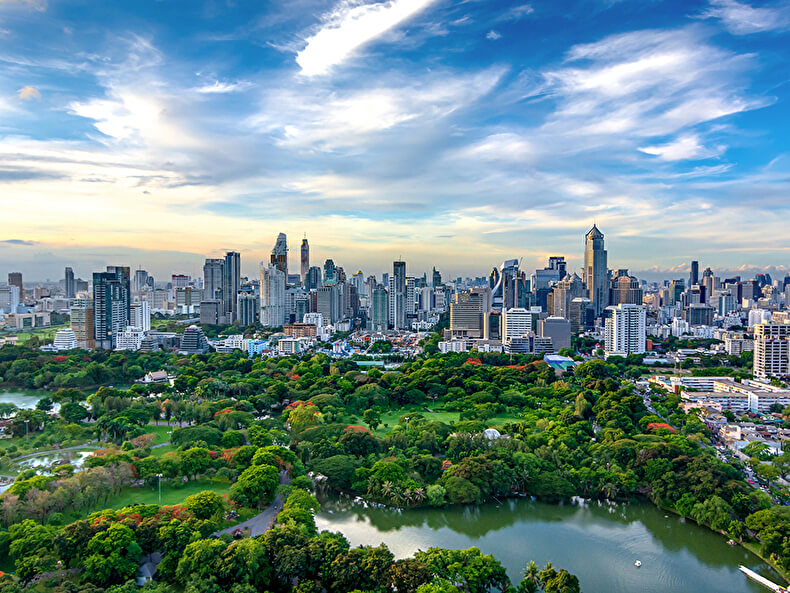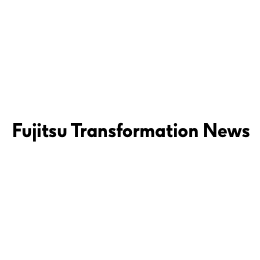- Contents
In December 2021, the Nikkei SDGs Festival Nihonbashi was held across five days (hosted by: Nikkei Inc. and Nikkei Business Publications, Inc.). This event was focused on achieving the Sustainable Development Goals (SDGs), and featured lectures and discussions held by key people from various sectors.
Fujitsu's panelist was Yumiko Kajiwara, who is the Corporate Executive Officer, CSO, and Head of the Sustainability Unit. She spoke about Fujitsu's approach to sustainability management as a responsible global enterprise aiming to realize a sustainable society.
The Transformations That Global Enterprise Should Make as Global Citizens
Kajiwara: Every year, the world is struck by record-breaking natural disasters and continues to lose biodiversity. Furthermore, the COVID-19 pandemic has made people acutely aware of issues outlined in the SDGs, such as inequality and economic disparity. As influential global citizens, global companies are facing an increasing expectation and pressure to do their part to solve these issues.
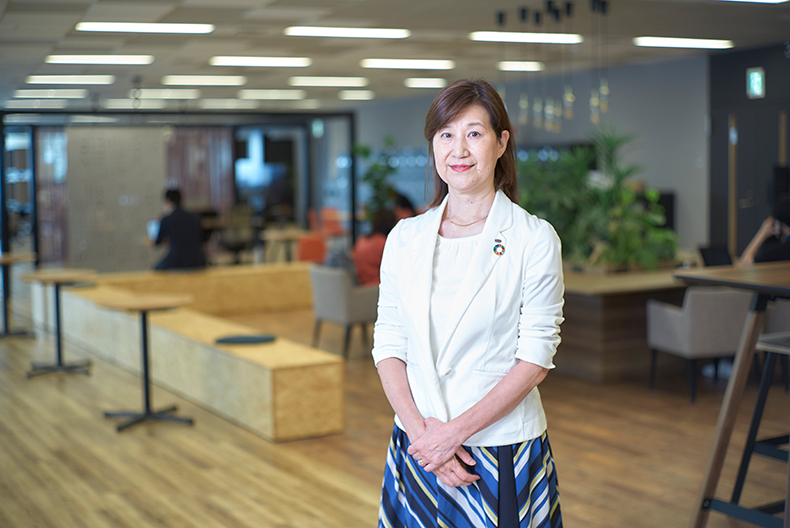 Yumiko Kajiwara, Corporate Executive Officer, CSO, and Head of the Sustainability Unit, Fujitsu Limited
Yumiko Kajiwara, Corporate Executive Officer, CSO, and Head of the Sustainability Unit, Fujitsu Limited
The World Business Council for Sustainable Development (WBCSD) is a coalition of CEOs that provides a place for companies around the world to build partnerships and collaborate to solve social issues.
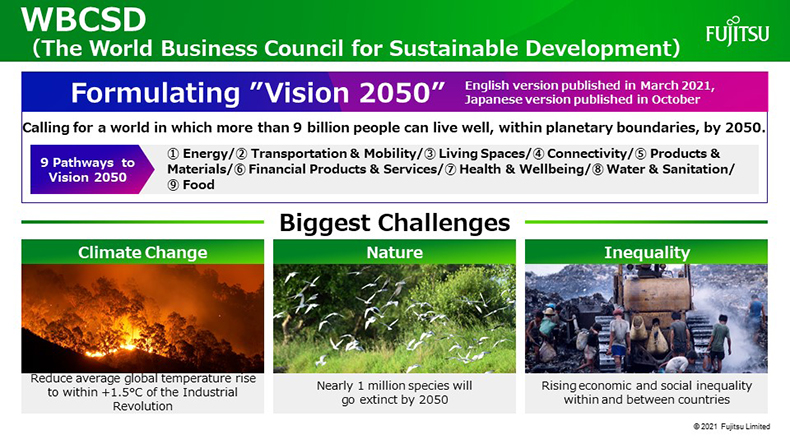
Kajiwara: The organization is known for its CEO-led efforts to engage the business world in creating a sustainable future. The coalition includes over 200 of the world's largest companies, and Fujitsu actively participates in the organization as a member of the Executive Committee.
WBCSD has set out "Vision 2050: Time to Transform," "calling for a world in which more than 9 billion people can live well, within planetary boundaries" by 2050.
In this vision, global warming will be stabilized at no more than 1.5°C, nature will be conserved and restored, and resources will be used in a sustainable manner. It also means that the human rights of all people will be respected, basic needs will be met, and equal opportunities will be available for everyone.
To be more specific, WBCSD has outlined nine pathways to achieve this vision. These pathways include: "Energy," which aims for net zero carbon energy, "Transportation & Mobility" that leaves nobody left behind, "Health & Wellbeing," which aims to improve access to healthcare, and "Food," which aims for sustainable food production. However, our biggest challenges—climate change, the natural environment, and inequality—have gotten worse, not better, and how we respond going forward will be critical to future outcomes.
The society in which "more than 9 billion people can live well, within planetary boundaries" laid out in "Vision 2050: Time to Transform" cannot be achieved if we continue our current social system. We need fundamental changes to our society as a whole. To achieve this, companies themselves must radically change their mindsets. Business mindsets in three areas are foundational to the required actions: 1. Reinvention (transforming our system of capitalism), 2. Resilience (enhancing business' capacity), and 3. Regeneration (build the capacity of social and environmental systems to heal and thrive).
Fujitsu’s Approach to Sustainability Management as a Responsible Global Enterprise
Kajiwara: As a global enterprise with a long history of delivering technology-based value to customers, we at Fujitsu strongly believe that it is our responsibility to contribute proactively to the transformation of society.
In 2020, we therefore established and announced our company's purpose, which is "to make the world more sustainable by building trust in society through innovation."This is the significance of Fujitsu's existence in society, and it is also the path we should follow.
The direction that Fujitsu is aiming for is the same as the world visualized in the 2030 Agenda for Sustainable Development as well as that of WBCSD's "Vision 2050: Time to Transform." To ensure that all of our business activities contribute to the realization of our purpose, we consider both financial and non-financial spheres when we conduct business. Including non-financial front in our management strategy enables us to make long-term, stable contributions to society, which in turn creates opportunities for the company to grow, creating a positive feedback loop.
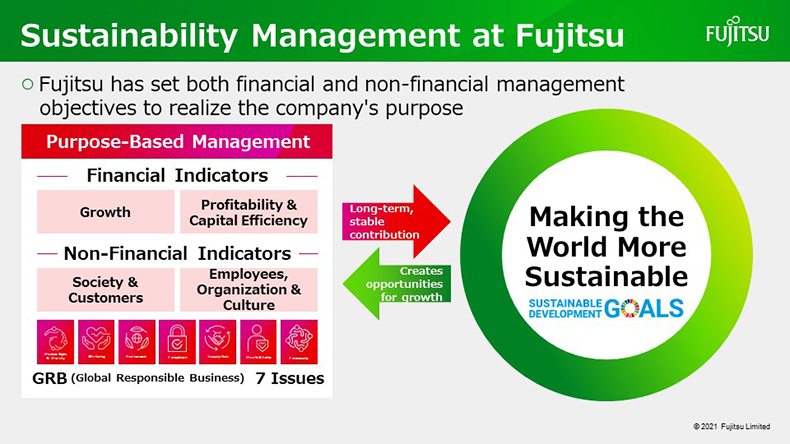
Kajiwara: As a priority issue in sustainability management, Fujitsu has established the Global Responsible Business (GRB) as a framework for non-financial indicators. In the backdrop of setting the GRB is the need for corporate management that considers all stakeholders when addressing social issues such as climate change and rising inequality. Since this is a global issue, we have assigned staff in charge of GRB both in Japan and overseas to work together on this issue. We also introduce GRB to our customers during dialogue.
The GRB sets seven priority issues.
The priority issues are "Human Rights, Diversity & Inclusion," "Wellbeing," and "Occupational Health and Safety," from our belief that it is important to respect the human rights of and consider the safety and security of our stakeholders, including employees. "Environment" is from our desire to work together with society and our customers to fulfill our responsibility to solve climate change and other environmental issues that will have a considerable long-term impact across borders.
"Compliance" and "Supply Chain" are from our high level of awareness regarding corporate ethics and our emphasis on sustainable procurement. "Community" represents our intent to contribute to global society as a responsible global citizen.
We have assigned Key Performance Indicators (KPI) to each of these seven priority issues. For example, for "environment," we aim to reduce our company's greenhouse gas emissions to levels in line with the 1.5°C target of the Paris Agreement, and we will also help solve our customers' various environmental issues by providing innovative solutions.
Fujitsu’s New Business Approach Towards Solving Social Issues
Kajiwara:In October 2021, Fujitsu unveiled its new business brand, Fujitsu Uvance, to help solve social issues and provide sustainable value to society. “Uvance” is a portmanteau of the words “universal” and “advance,” and embodies a concept of making all (universal) things move forward (advance) in a sustainable direction.
Because the world is becoming more intricately connected than ever before, social issues and actions elsewhere in the world can have a profound impact on our lives. We therefore imagined how society would be in 2030, which is the year by which the SDGs are meant to be achieved, and established “Fujitsu Uvance” as part of our efforts to realize our purpose. We launched this new business brand hoping to build new possibilities by connecting people, technology and ideas, and create a more sustainable world where anyone can advance their dreams.
Under the "Fujitsu Uvance" brand, we will conduct business activities with a focus on solving social issues in order to realize a sustainable world.
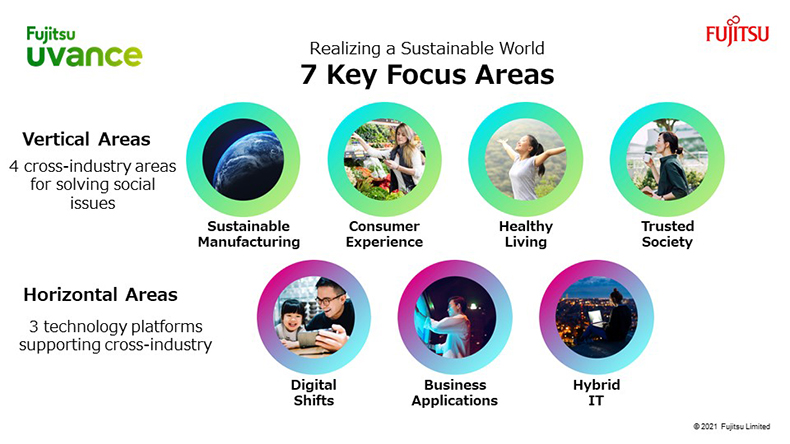
Kajiwara: "Fujitsu Uvance" is composed of seven key focus areas.
Sustainable Manufacturing, Consumer Experience, Healthy Living, and Trusted Society are the four cross-industry areas for solving social issues, shown in the four circles in the top row. Digital Shifts, Business Applications, and Hybrid IT are the three technology platforms supporting cross-industry, represented by the three circles in the bottom row.
We are already collaborating with companies and local governments in many areas, such as "Consumer Experience," which revolutionizes consumer behavior with digital technology, and "Digital Shifts," which promotes agile management that uses data and technology to create an environment in which people can harness their creativity and productivity to their full potential.
Towards the Realization of a Sustainable Future
Kajiwara: This is Fujitsu's Value Creation Model.
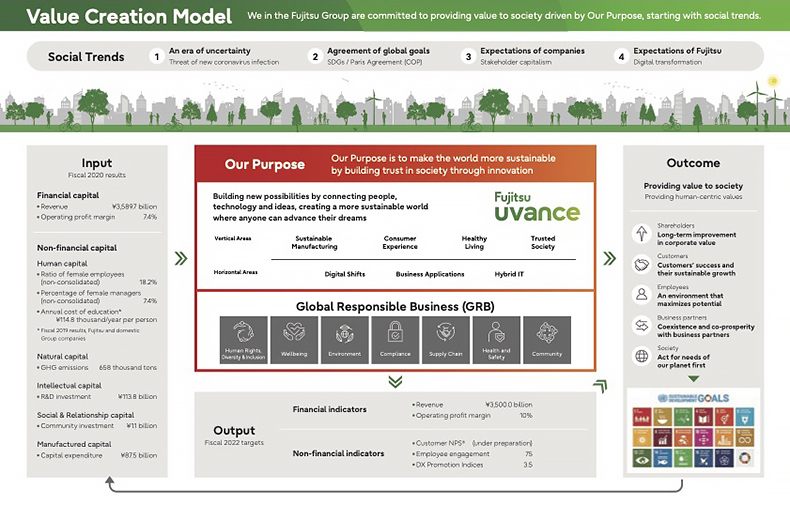
Kajiwara: The seven key focus areas of "Fujitsu Uvance" and the non-financial GRB activities that support those areas help us realize our purpose, which is to make the world more sustainable.
This model depicts a positive feedback loop in which we input our company's financial and non-financial capital, and through our corporate activities, achieve the outcome of contributing value to society while also increasing our company's capital.
In this way, we will combine financial and non-financial elements to create corporate value and advance corporate management amid a rapidly changing society.
In preparation for 2030 and the future beyond, we at Fujitsu will use our strengths as a technology company and create value through our journey to realize our purpose. As the CSO, I will continue to promote sustainability management to foster trust from our customers and society, and work to build a sustainable future in cooperation with our stakeholders.


